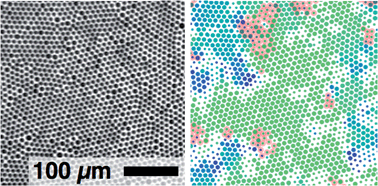Role of disorder in finite-amplitude shear of a 2D jammed material†
Abstract
A material's response to small but finite deformations can reveal the roots of its response to much larger deformations. Here, we identify commonalities in the responses of 2D soft jammed solids with different amounts of disorder. We cyclically shear the materials while tracking their constituent particles, in experiments that feature a stable population of repeated structural relaxations. Using bidisperse particle sizes creates a more amorphous material, while monodisperse sizes yield a more polycrystalline one. We find that the materials' responses are very similar, both at the macroscopic, mechanical level and in the microscopic motions of individual particles. However, both locally and in bulk, crystalline arrangements of particles are stiffer (greater elastic modulus) and less likely to rearrange. Our work supports the idea of a common description for the responses of a wide array of materials.


 Please wait while we load your content...
Please wait while we load your content...